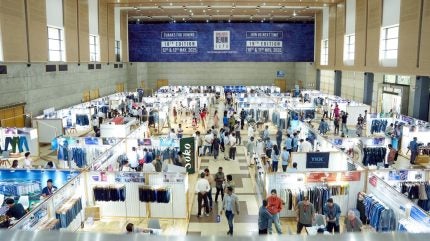
Despite the challenges posed by ongoing global tariff and trade disputes, the panellists at the Bangladesh Denim Expo expressed confidence in Bangladesh’s ongoing role as a key player in the global sourcing landscape.
The two-day event, which began on 12 May, has drawn 57 exhibitors from 13 different nations, including the host country, India, China, Germany, Türkiye, Pakistan, Spain, Italy, Vietnam, the UAE, Switzerland, and the US.

Discover B2B Marketing That Performs
Combine business intelligence and editorial excellence to reach engaged professionals across 36 leading media platforms.
The expo featured panel sessions on topics such as “the growth of the Bangladesh denim industry through the perspective of denim washing” and “stretchability of Bangladesh denim traceability.”
Industry experts, including Well of Washing director Abdus Samad, Ruhrose RBT co-founder and creative director Arief Labu and the Woolmark Company’s processing innovation and education extension GM Julie Davies were among those sharing their insights at the event.
Bangladesh Denim Expo founder and CEO Mostafiz Uddin said the country’s apparel exports to the US increased by 26.64% in the first quarter of 2025, placing the nation at the forefront of apparel exporters to the US, surpassing India’s 24.04% increase and outpacing Pakistan, Vietnam, and China which saw rises of 17.49%, 13.96%, and 4.18% respectively.
This growth comes at a time when the US market faces volatility due to recent reciprocal tariffs imposed by the Trump administration, he noted.

US Tariffs are shifting - will you react or anticipate?
Don’t let policy changes catch you off guard. Stay proactive with real-time data and expert analysis.
By GlobalDataUddin added: “I think even on the negotiation table of the trade issues our card should be the industry’s steady progress towards skill development, sustainability and innovation. As we need our trade partners as much as their consumers need us.’’
Bangladesh is also the largest denim exporter to both the US and Europe, with the country enjoying duty-free market access to the EU under the Everything But Arms (EBA) and Generalised Scheme of Preferences (GSP) as a least developed country (LDC).
Under the GSP, vulnerable developing countries like Bangladesh, Cambodia and Myanmar, can import into the EU market without any taxes.
Bangladesh is set to transition to a developing nation next year and without attaining GSP Plus status by 2029, it could lose its duty-free export privileges to the EU, where it exported 50.15% of its apparel.
The expo featured a fashion trend-zone showcasing innovative denim fabrics and designs from Bangladesh’s burgeoning industry.
Additionally, Square Denims garment unit operation head Mohammad Jahangir Alam held a special session on ‘The denim business beside sewing and wash production.’
Uddin explained: “In the last edition of the Bangladesh Denim Expo, we had expert panel sessions on the LDC graduation where all speakers unanimously stressed the importance of capacity building within the industry to cope up with changing tariff regimes. So, in this edition of the expo, all the panel sessions we designed are solely meant for capacity building both the professionals and the industry itself. You may also say that from this edition we shifted from plans to actions to prepare Bangladesh’s denim industry for 2029 and beyond.”
In April this year, the Bangladesh Textile Mills Association (BTMA) urged the US embassy and the National Cotton Council of America (NCC) to allow duty-free access for Bangladeshi garments made from US cotton.





